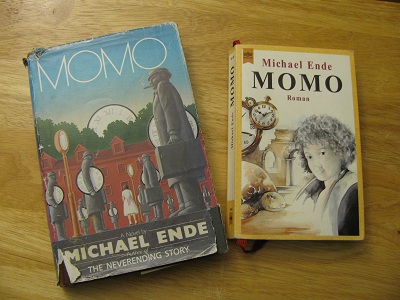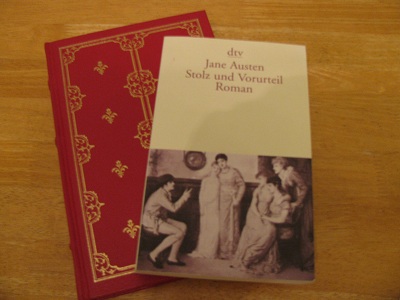Sonderling Sunday – Momo Drittes Kapitel
It’s time for Sonderling Sunday, that time of the week when I play with language by looking at the German translation of children’s books, or, in this case, the English translation of a German children’s book.
Tonight I’m back to one of my very favorite children’s books, which was originally written in German. This copy of Momo, by Michael Ende, was my very first non-food purchase when I lived in Germany.
Last time, we left off at the end of Chapter 2, so now we are at the start of Drittes Kapitel, the Third Chapter. The German title is Ein gespielter Sturm und ein wirkliches Gewitter (“A play storm and a real thunderstorm”). The English title is only “Make-believe.” I wish they had translated the chapter titles more directly!
Here are the first two sentences:
Es versteht sich wohl von selbst, daß Momo beim Zuhören keinerlei Unterschied zwischen Erwachsenen und Kindern machte. Aber die Kinder kamen noch aus einem anderen Grund so gern in das alte Amphitheater.
= “Although Momo listened to grown-ups and children with equal sympathy and attention, the children had a special reason for enjoying their visits to the amphitheater as much as they did.”
(More direct translation: “Needless to say by itself, that Momo made no difference in listening between grown-ups and children. But the children had yet another reason to so love coming to the old amphitheater.”
“They were never bored for an instant.”
= Es gab einfach keine langweiligen Augenblicke mehr.
(“There were simply no boring moments any more.”)
“ingenious suggestions” = gute Vorschläge
“One hot and sultry afternoon” = Einmal, an einem schwülen, drückenden Tag
“stone steps” = steinernen Stufen
“shrugged her shoulders” = zuckte die Schultern
“first mate” = der Erste Steuermann
“a scientist” = ein Naturforscher
“scientific expedition” = Forschungsreise (Ah! A case where the German has one tidy word for it!)
“sailors” = Matrosen
“ship of the future” = Zukunftsschiff
“living memory” = Menschengedenken
“abounded with shoals, reefs, and mysterious sea monsters”
= wimmelte hier von Untiefen, von Korallenriffen und von unbekannten Seeungeheuern
“Traveling Tornado” = Ewigen Taifun (“Eternal Typhoon”)
“unpredictable” = unberechenbar
“mighty embrace” = riesenhaften Klauen
“Traveling Tornado” = Wandernden Wirbelsturm
(This time the German is using more variation — the trend here is that the original language is more creative! The first time, Ewigen Taifun was a description of the storm. Wandernden Wirbelsturm is its name.)
“adamantium, a steel as tough and flexible as a sword blade”
= blauem Alamont-Stahl, der biegsam und unzerbrechlich war wie eine Degenklinge
“special process” = Herstellungsverfahren
“an old salt” = ein Seebär von altem Schrot und Korn (“a sea-bear from old grist and grain”)
“cross-legged” = mit untergeschlagenen Beinen
“melodious” = wohlklingenden
“crow’s nest” = Ausguck
“rope ladder” = Strickleiter
“slippery” = glitschig
“dome” = Kuppeldach
“giant jellyfish” = Riesenqualle
“tentacles” = Fangarmen
“terrible embrace” = schrecklichen Umklammerung
“jolt” = Erschütterung
“limp and lifeless” = schlaff und kraftlos
“Danger’s our trade.” = Die Gefahr ist unser Beruf.
“rescue operation” = Rettungsarbeiten
“crew” = Besatzung
“paralyzed with fear” = in Ohnmacht gefallen
“stood foursquare” = stand breitbeinig
“composure” = Kaltblütigkeit (“cold-bloodedness”)
“shaft of lightning” = Blitzstrahl
“cables and stanchions” = Stahltrossen und Eisenstangen (“steel bunches and iron rods”)
I’m going to finish up with this paragraph, a bit more dramatic in German:
Blitz auf Blitz und Donnerschlag auf Donnerschlag! Heulender Sturm! Haushohe Wogen und weißer Schaum!
= “Flashes of lightning and peals of thunder followed one another in quick succession, the wind howled, and mast-high breakers deluged everything with foam.”
(“Lightning on lightning and thunderclap on thunderclap! Howling storm! House-high waves and white foam!”)
That’s it for tonight! Now you have some handy phrases for your next sea voyage, real or imaginary, on a German ship!









